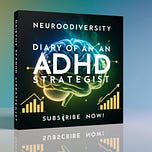The Invisible Pain of Rejection
Sarah sat in her car, tears streaming down her face after a seemingly innocuous meeting with her boss. All he'd said was, "We should revisit your approach on this project," but to Sarah, those words felt like a devastating blow.
For the rest of the day, she battled overwhelming feelings of shame and inadequacy, replaying the conversation repeatedly in her mind.
Her friends and family often described her as "too sensitive" or suggested she develop "thicker skin," but they didn't understand that her reactions weren't a choice—they were an intense, involuntary response that felt like emotional free fall.
What Sarah experiences has a name: Rejection Sensitive Dysphoria (RSD). And like approximately 99% of adults with ADHD, she lives with this intense emotional sensitivity that can transform perceived criticism into debilitating emotional pain.
battled overwhelming feelings of shame and inadequacy
Breaking It Down: What's This All About?
Rejection Sensitive Dysphoria is characterized by an extreme emotional sensitivity and intense pain triggered by the perception of being rejected or criticized by important people in one's life. The term "dysphoria," coming from Greek, literally means "hard to bear"—aptly describing the unbearable emotional response experienced by those with this condition.
RSD isn't simply being "too sensitive." It's a neurobiological phenomenon likely representing an intrinsic feature of ADHD rather than solely environmental factors. While not formally recognized in diagnostic manuals like the DSM-5, many experts acknowledge RSD as a legitimate and significant concern directly linked to the broader difficulties in emotional regulation experienced by those with ADHD brains.
being rejected or criticized by important people in one's life
Why This Matters
For individuals with ADHD, RSD isn't just an occasional emotional hiccup—it often becomes a driving force behind major life decisions and daily functioning.
Many adults with ADHD report that RSD affects their:
Career choices and advancement, as they avoid situations where criticism might occur
Personal relationships, leading to people-pleasing behaviors or relationship avoidance
Self-image and confidence, creating a cycle of anticipated rejection
Mental health, contributing to anxiety, depression, and chronic emotional distress
Research indicates that many individuals with ADHD consider their difficulties with emotional dysregulation, including RSD, to be as impairing or more impairing than the classic symptoms of inattention and hyperactivity that define the disorder.
The Science Behind It
The connection between ADHD, emotional dysregulation, and RSD is rooted in neurobiological differences that affect how the brain processes emotional information and regulates responses.
Research published in PMC demonstrates that emotional dysregulation is present in 25-45% of children and 30-70% of adults with ADHD. This isn't coincidental—it reflects underlying neurological processing differences.
Several key brain-based factors contribute to RSD in ADHD:
Neurotransmitter Dysregulation: Imbalances in dopamine and norepinephrine—the same neurotransmitters implicated in core ADHD symptoms—affect reward processing and emotional regulation. These chemical messengers influence how intensely emotions are felt and processed.
Amygdala Activity: Brain imaging studies suggest heightened activity in the amygdala, the brain's emotion processing center, leading to amplified emotional reactions to perceived rejection or social threats.
Prefrontal Cortex Function: The brain region responsible for executive functions shows altered activity in ADHD, impairing the ability to effectively modulate emotional responses or accurately interpret social cues.
Studies examining emotional processing in ADHD brains reveal a neurobiological basis for these intense emotional reactions—they aren't character flaws but reflections of actual differences in brain structure and function.
This isn't coincidental—it reflects underlying neurological processing differences
Making It Work: How to Apply This in Real Life
Living with RSD requires developing strategies to manage the intense emotional responses. Here are science-backed approaches to help navigate these challenges:
✅ Step 1: Recognize the Trigger –
Learn to identify when RSD is activating. Keep a journal of situations that trigger intense emotional reactions to spot patterns in your emotional responses.
✅ Step 2: Create Emotional Space –
When you feel the intense emotions of RSD beginning, practice the "90-second rule"—emotional chemicals physically process through your body in about 90 seconds if you don't feed them with repetitive thoughts.
✅ Step 3: Challenge Interpretations –
Develop the habit of questioning your initial perception. Ask: "Is there another way to interpret this interaction?" or "What evidence exists that this isn't a personal rejection?"
✅ Step 4: Implement DBT Skills –
Dialectical Behavior Therapy techniques like mindfulness, distress tolerance, and emotional regulation can significantly reduce RSD's emotional impact.
✅ Step 5: Consider Medical Support –
Discuss medication options with your healthcare provider. Alpha-2 agonists like guanfacine and clonidine have shown promise in treating emotional dysregulation, with approximately 30% of individuals experiencing relief from RSD.
Real-Life Examples in Action
Maya, a graphic designer with ADHD, used to experience devastating emotional reactions whenever clients requested revisions to her work.
After learning about RSD, she implemented a personal "24-hour response" rule for client feedback—giving herself time to process emotional reactions before responding.
She also created a feedback document template that helped her frame criticism as specific, actionable items rather than personal attacks. Within six months, Maya not only retained more clients but also reported significantly lower emotional distress at work.
Dr. James Harris, a psychology professor with ADHD, relates how understanding RSD transformed his academic career: "I'd spiral into shame when colleagues critiqued my research. Learning it was RSD—not personal inadequacy—was life-changing.
I developed scripts for academic discussions that helped me separate scholarly debate from personal worth. Now I actively seek feedback, knowing my initial emotional response doesn't reflect reality's truth."
helped her frame criticism as specific, actionable items rather than personal attacks
Pro Tips & Insider Insights
🔹 Externalize Criticism: When receiving feedback, write it down verbatim rather than relying on your emotional memory of it. This provides objective distance and prevents catastrophizing the critique.
🔹 Prepare Rejection Scripts: Develop specific phrases to tell yourself when RSD activates, such as "This is my brain's rejection sensitivity, not necessarily reality" or "My worth isn't determined by this interaction."
🔹 Time-Block Rumination: If you can't stop obsessing over a perceived rejection, schedule a specific 15-minute "worry time," then firmly redirect your thoughts to other activities until then.
🔹 Build a Validation Portfolio: Create a document or folder with evidence of your successes, positive feedback, and accomplishments. Review it when RSD threatens your self-perception.
Quick Cheat Sheet
🔹 RSD causes intense, painful emotional reactions to perceived rejection that are neurobiological in ADHD brains.
🔹 Up to 99% of adults with ADHD experience RSD, making it a nearly universal aspect of the condition.
🔹 Effective treatments include cognitive reframing, DBT skills, medication options, and developing personalized coping plan strategies.
🔹 Creating separation between the initial emotional response and your actions is critical for managing RSD effectively.
🔹 RSD isn't a personal weakness—it's a neurological difference requiring specific management approaches and understanding.
Further Reading (Books & Resources)
📖 Taking Charge of Adult ADHD by Russell A. Barkley – Comprehensive guide with sections on emotional regulation in ADHD.
📖 The DBT Skills Workbook for ADHD by Laura MacNiven – Practical exercises specifically adapted for ADHD emotional challenges.
📖 The Rejection Sensitivity Workbook by Catherine Saint Louis – Focused strategies for overcoming rejection sensitivity.
Practical Tools & Apps
🔧 Mood Meter – App that helps identify and label emotions, building emotional awareness critical for RSD management.
🔧 Headspace – Meditation app with specific programs for handling difficult emotions and building resilience.
🔧 ThoughtDiary – CBT-based tool for challenging distorted thoughts common in RSD reactions.
🔧 DBT Coach – Mobile application providing in-the-moment DBT skills for emotional regulation.
Research & Studies Section (Citations & Sources)
Barkley, R. A. (2015). Emotional dysregulation is a core component of ADHD. In R. A. Barkley (Ed.), Attention-deficit hyperactivity disorder: A handbook for diagnosis and treatment (pp. 81-115).
Dodson, W. (2021). Emotional regulation and rejection sensitivity in ADHD. ADDitude Magazine. https://www.additudemag.com/rejection-sensitive-dysphoria-and-adhd/
Shaw, P., Stringaris, A., Nigg, J., & Leibenluft, E. (2014). Emotion dysregulation in attention deficit hyperactivity disorder. American Journal of Psychiatry, 171(3), 276-293.
Surman, C. B., Biederman, J., Spencer, T., Miller, C. A., McDermott, K. M., & Faraone, S. V. (2013). Understanding deficient emotional self-regulation in adults with attention deficit hyperactivity disorder: a controlled study. ADHD Attention Deficit and Hyperactivity Disorders, 5(3), 273-281.
Cleveland Clinic. (2023). Rejection Sensitive Dysphoria (RSD): Symptoms & Treatment. https://my.clevelandclinic.org/health/diseases/24099-rejection-sensitive-dysphoria-rsd
Now What?
Understanding RSD doesn't just explain painful emotional experiences—it opens doors to effective management strategies.
If you recognize these patterns in yourself or someone you care about, know that you're not "too sensitive"—you're experiencing a neurobiological reality that requires specific approaches.
Begin implementing the strategies outlined here, and consider discussing RSD with your healthcare provider to develop a comprehensive management plan.
🎧 For more insights, check out this Diary of an ADHD Strategist podcast:














Share this post